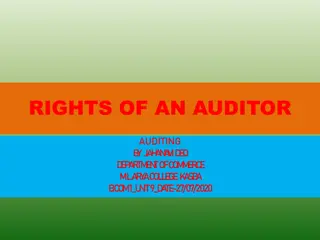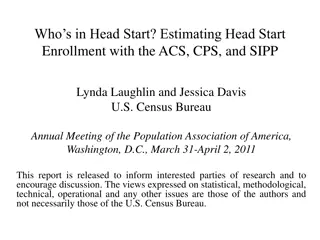Company Auditor: Eligibility Criteria and Ineligibility Factors
Ensuring the right qualifications for appointment as an auditor of a company is crucial. Explore the eligibility criteria and factors that make individuals ineligible for the role, highlighting the importance of integrity and independence in auditing practices.
Download Presentation

Please find below an Image/Link to download the presentation.
The content on the website is provided AS IS for your information and personal use only. It may not be sold, licensed, or shared on other websites without obtaining consent from the author.If you encounter any issues during the download, it is possible that the publisher has removed the file from their server.
You are allowed to download the files provided on this website for personal or commercial use, subject to the condition that they are used lawfully. All files are the property of their respective owners.
The content on the website is provided AS IS for your information and personal use only. It may not be sold, licensed, or shared on other websites without obtaining consent from the author.
E N D
Presentation Transcript
Company Auditor Presented by Dr. S. D. Ratnaparkhe Assistant Professor Department of Commerce Deogiri College, Aurangabad
Company Auditor Eligibility of Auditor (1) A person shall be eligible for appointment as an auditor of a company only if he is a chartered accountant in practice. (2) Where a firm is appointed as an auditor of a company, only the partners who are Chartered Accountants in practice shall be authorized by the firm to act and sign on behalf of the firm.
Ineligibility of Auditor None of the following persons shall be eligible for appointment as an auditor of a company, namely: (a) a body corporate; (b) an officer or employee of the company; (c) a person who is a partner, or who is in the employment, of an officer or employee of the company; (d) a person who, or his relative or partner (i) is holding any security of the company or its subsidiary , or of its holding or associate company or a subsidiary of such holding company , of value in terms of such percentage as may be prescribed; (ii) is indebted to the company, or its subsidiary, or its holding or associate company or a subsidiary of such holding company; or (iii) has given a guarantee or provided any security in connection with the indebtedness of any third person to the company, or its subsidiary, or its holding or associate company or a subsidiary of such holding company, for such amount as may be prescribed; (e) a person or a firm who has business relationship with the company, or its subsidiary, or its holding or associate company or subsidiary of such holding company or associate company of such natureas may be prescribed; (f) a person whose relative is in the employment of the company as a director or key managerial personnel ; (g) a person who is in full time employment elsewhere or a person or a partner of a firm holding appointment as its auditor, if such persons or partner is at the date of such appointment or reappointment holding appointment as auditor of more than twenty companies other than one person companies, dormant companies, small companies and private companies having paid-up share capital less than one hundred crore rupees (h) a person who has been convicted by a court of an offence involving fraud and a period of ten years has not elapsed from the date of such conviction; (i) a person who, directly or indirectly, renders any service referred to in section 144 to the company or its holding company or its subsidiary company. Explanation. For the purposes of this clause, the term directly or indirectly shall have the meaning assigned to it in the Explanation to section 144
Qualification of Auditor(U/s 141) Only a Chartered accountant can be appointed as a company auditor. In case of firm, only if the majority of partners practicing in India are chartered Accountants firm shall be eligible to be appointed as Company Auditor. However only the partners who are CA s shall be authorized to act and sign on beh
Disqualification ( U/s 141(3)) A body corporate (other than LLP s) An Officer or employee of the company A person who is a partner, or who is in the employment, of an officer or employee of the company A person who, or his relative or partner.
Appointment of Auditor (139 of Companies Act,2013) Applicability To all types of companies Manner and Procedure of selection of auditor (Rule 3) Audit Committee shall recommend name of individual/firm to BOD Board agrees :- Recommend such name to members Board Disagrees :- Refer Back recommendation to such name to Audit Committee reconsideration citing reasons for such disagreement members
Appointment of Auditor (1st Auditor) Auditor of Non-Government Companies (139(6)) The first auditor of a company shall be appointed by the board of directors within thirty days from the date of registration of the company. In the case of failure of the Board to appoint such auditor, it shall inform the members of the company, who shall within ninety days (next 60 days) at an extraordinary general meeting appoint such auditor and such auditor shall hold office till the conclusion of the first annual general meeting.
Appointment of Auditor (Subsequent U/S 139 (1)) Appointment by members in AGM by passing OR. Hold office from conclusion of 1st AGM to 6th AGM subject to fulfillment of certain conditions.
Appointment of Auditor (1st Auditor(Goverment Company)) The first auditor shall be appointed by the Comptroller and Auditor General of India within 60 days from the date of registration of the company. In case the Comptroller and Auditor-General of India does not appoint such auditor within said period, the Board of Directors of the company shall appoint such auditor within the 30. In the case of failure of the Board to appoint such auditor within the next 30 days, it shall inform the embers of the company who shall appoint such auditor within the 60 days at an extraordinary general meeting, who shall hold office till the conclusion of the first annual general meeting
Rotation of Auditor Applicability of Rotation Rotation is applicable to a listed company and following classes of companies excluding OPC and small companies:- a. All unlisted companies having paid-up share capital of rupees ten crore or more; b. All private companies having paid-up share capital of rupees fifty crore or more; c. All companies having paid up capital below threshold limit mentioned in (a) and (b) above, but having public borrowings from financial institutions, banks or public deposits of rupees fifty corers or more.
Tenure of auditor One term of 5 consecutive years-individual Two terms of 5 consecutive years-Firm In accordance with the Audit rules, a break in the for a continuous period of five years is considered as fulfilling the requirement of rotation. In other words, an audit firm becomes eligible of fresh appointment only if there has been a beak in the audit service for a continuous period of give years.
Cooling Period Five years from the date on which the term of five consecutive years or two terms of five consecutive years comes to an end in case of individual auditor and a firm of auditor respectively. An Individual (Practicing Chartered Accountant) shall be appointed for a period of five consecutive years which is considered as One Term. A Firm (Practicing Chartered Accountant Firm) shall be appointed/re-appointed for a period of maximum two terms of five consecutive years and minimum for one term
Removal of auditor (u/S 140(1)) Removal of auditor appointed under section 139 may be removed from his office before the expiry of his term only by passing a special resolution and obtaining the previous approval of the central Government in the prescribed manner. Before removal, the auditor shall be given a reasonable opportunity of being heard. Procedure of reoval Board Resolution should be passed. Application to CG is made in Form ADT-2 within 30 days of Board Resolution. Hold General Meeting and pass SR within 60 dyas of receipt of CG approval.
Resignation by Auditor 140(2) The auditor who has resigned from the company shall file within a period of thirty days from the date of resignation, Form No. ADT-3 to Company and ROC within 30 days of resignation. Reasons and other facts must be indicated in form. Auditor of Government Company shall file such requirements to CAG
Powers of Company Auditors Right to Access Book of Accounts Receive Notice of General Meetings Attend General Meetings Enquires (143(1)) Sign Audit Report
Duties of Company Auditors Whether loans and advances made by the company on the basis of security have been properly secured and whether the terms on which they have been made are prejudicial of the interest of the company or its members. Whether transactions of the company which are represented merely by book entries are prejudicial to the interests of the company. Whether assets of the company like shares, debentures and other securities have been sold at a price less than at which it was purchased by the company. Whether loans and advances made by the company have been shown as deposits. Whether personal expenses have been charged to revenue account. In case of shares of the company issued for cash, whether cash has actually been received and if the position of the book of accounts is correct
LIABILITY OF AUDITORS UNDER COMPANIES ACT, 2013 Penalty for non-compliance with any of the provisions contained in Sections 139, 143, 144 Section 139 contains provisions regarding appointment of auditors, Section 143 regarding power and duties of auditors, Section 144 regarding certain services which an auditor cannot render and Section 145 regarding signing of audit report and other documents by auditor. Auditor shall be punishable with fine which shall not be less than Rs. 25,000/- but which may If an auditor has contravened such provisions knowingly or willfully with the intention to deceive the company or its shareholders or creditors or tax authorities, he shall be punishable with imprisonment for a term which may extend to 1 yea rand with fine which shall not be less than Rs. 1,00,000/- but which may If the auditor is convicted under any of these sections, he shall be liable to refund the remuneration received by him from the Company and pay for damagesto the company, bodies or authorities or to any other persons for loss arising out of incorrect or misleading statements of particulars made in his audit report. and 145 of the Act extend to Rs. 5,00,000/- extend to Rs. 25,00,000/-.
LIABILITY OF AUDITORS UNDER COMPANIES ACT, 2013 Penalty for failure As per Section 143(12), an Auditor is duty bound that if in the course of the performance of his duties as auditor, he has reason to believe that an offence involving fraud is being or has been committed against the company by officers or employees of the company, he shall immediately report the matter to the Central Government. In case of any failure on his part to comply with this duty, he shall be punishable with fine which shall not be less than Rs. 1,00,000/- but which may extend to Rs. 25,00,000/-. to disclose fraud
LIABILITY OF AUDITORS UNDER COMPANIES ACT, 2013 Penalty for professional misconduct NFRA Watch on the watch dogs! National Financial Review Authority (NFRA) shall have power to investigate, either suo motu or on a reference made to it by the Central Government into the matters of professional or other misconduct committed by any member or firm of chartered accountants, registered under the Chartered Accountants Act, 1949. Where professional or other misconduct is proved, NFRA shall have the power to make order for (A) imposing penalty of I) not less than Rs. 1,00,000/-, but which may extend to five times of the fees received, in case of individuals; and (II) not less than Rs. 10,00,000/-, but which may extend to ten times of the fees received, in case of firms; B) debarring the member or the firm from engaging himself or itself from practice as member of the Institute of Chartered Accountant of India referred to in clause (e) of sub-section (1) of section 2 of the Chartered Accountants Act, 1949 for a minimum period of 6 months or for such higher period not exceeding 10 years as may be decided by the National Financial Reporting Authority.
LIABILITY OF AUDITORS UNDER , Income Tax Act,1961. Under Section U/s 288. If a person has been convicted of nay offence connected with any Income tax proceedings or on whom a penalty has been imposed (except penalty under section 271(1) i.e. nominal penalty of Rs. 10,000 is disqualified from representing an assesses for a period decided by the Comissioner of Income tax chief Commissioner/
LIABILITY OF AUDITORS UNDER , Income Tax Act,1961 Under Section 278 If false information has been filed to Income Tax Authorities willfully. (a) Amount of tax, penalty or interest evaded exceeds Rs.25,00,000/-, imprisonment ranging from 6 months to 7 years and fine. (b) Any other case Imprisonment ranging from 3 months to 2 years and fine.
Remuneration of Auditor The process of determination Remuneration of auditors The remuneration of the auditor of the company will be fixed in a general meeting or in such a manner as may be prescribed therein. Provided the Board of directors may fix the remuneration of the first auditor appointed by them. The remuneration will be the fees payable to the auditor, accompanied by the expenses that are incurred by the auditor with regard to the audit of the company & any facility extended to him by the Companies Act. Section 142. The Remuneration of the Auditor might be fixed in a general meeting or in such a manner as may be determined. Even though the Board of directors can fix the remuneration of the First Auditor. The Expenses which are paid to the auditors are in addition to the audit that he carries out in the Company.
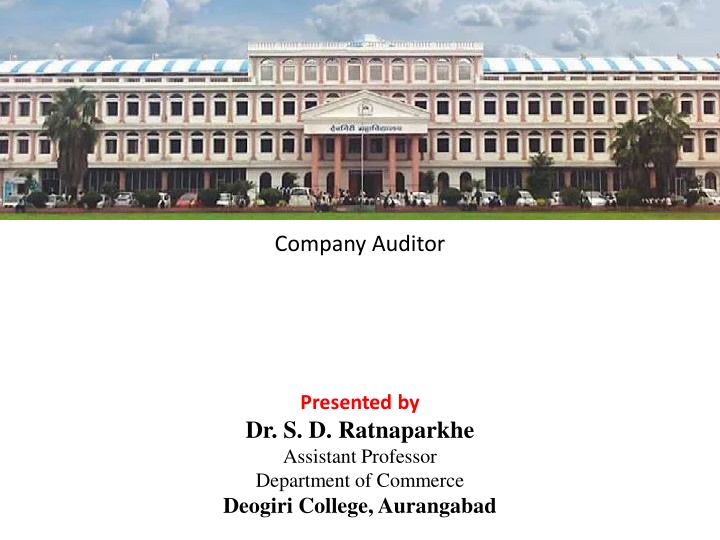


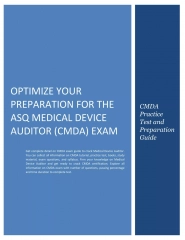
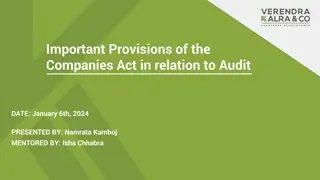
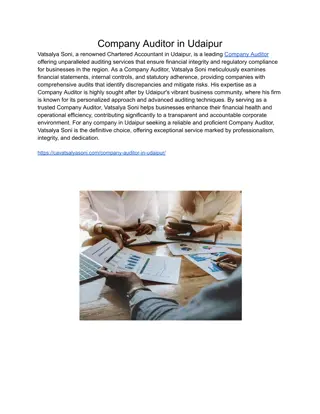
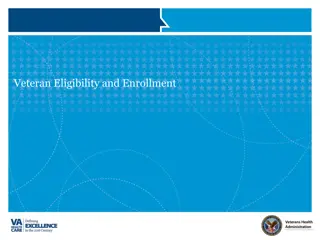





![Year-End Business Report for [Company Name]](/thumb/131798/year-end-business-report-for-company-name.jpg)
